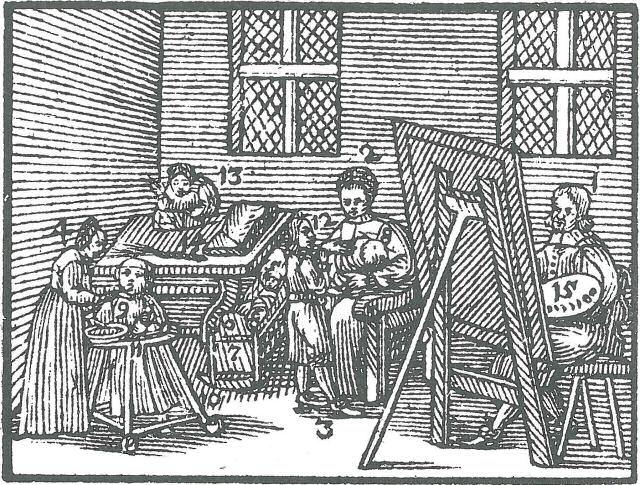British Economic and Social History, c. 1500-1750

"From J. Comenius, _Orbis Sensualium Pictus_ (1659), the first English picture book to teach children Latin through their native language, identifying words by numbers in the pictures. Father (1) is an artist, and his palette (15) provides a pun for the phrase ‘The father maintaineth his children by taking pains.’"
This course covers the social and economic history of Britain from the introduction of the printing press to the beginning of industrialization, with particular attention to what we call class and gender today, which at the time they might have called sorts and sex. Over this period the population of England, Wales and Scotland doubled. This led to social problems such as inflation, increased unemployment and poverty because of higher prices. At the same time, increased demand led to a more commercially oriented agriculture and manufacturing, and increased urbanization - spectacularly so in the case of London. Tensions arose between communal unity and competition. Opportunities for profit had a profound effect on the social order and also led to a great expansion of overseas trade and ultimately colonization and the introduction of slave labour in the new world.
This was also the period of the English Reformation, and conflicts over the nature and form of religious belief were bound up with two other great developments of the period: the spread of print culture and education based on printed books and the dissemination of classical ideals and knowledge in the vernacular. Conflicts and social tensions created by economic and cultural change led to an astonishing rise in litigation by ordinary people to resolve conflict. This legal structure was organized around centralized authority, and along with other developments this expansion marked the beginnings of the modern state. Despite such changes, popular beliefs such as witchcraft nevertheless survived, as also belief in the power of inherited social status and innate gender difference.
For further information please follow the link below.
This material is intended for current students but will be interesting to prospective students. It is indicative only.
